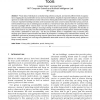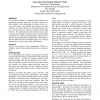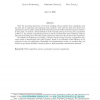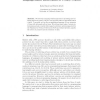137
click to vote
CORR
2011
Springer
14 years 8 months ago
2011
Springer
Privacy policies often place requirements on the purposes for which a governed entity may use personal information. For example, regulations, such as HIPAA, require that hospital ...
127
click to vote
IEEESP
2010
15 years 25 days ago
2010
Abstract—Private data of individuals is constantly being collected, analyzed, and stored by different kinds of organizations: shopping sites to provide better service and recomme...
106
click to vote
RE
2002
Springer
15 years 2 months ago
2002
Springer
Privacy has recently become a prominent issue in the context of electronic commerce websites. Increasingly, privacy policies posted on such websites are receiving considerable att...
117
click to vote
CACM
1999
15 years 2 months ago
1999
To facilitate the sharing of information using modern communication networks, users must be able to decide on a privacy policy--what information to conceal, what to reveal, and to...
106
click to vote
DIM
2008
ACM
15 years 4 months ago
2008
ACM
We propose a system called "Privacy Policy Matching Engine", which enables a matching of a user's intention to provide his/her identity-related data and enterprises...
106
Voted
FC
2006
Springer
15 years 6 months ago
2006
Springer
With the increasing importance of correctly handling privacy-sensitive data, significant work has been put in expressing and enforcing privacy policies. Less work has been done ho...
132
click to vote
ETRICS
2006
15 years 6 months ago
2006
To cope with the complex requirements imposed on the processing of privacy-sensitive data within enterprises, the use of automatic or semi-automatic tools is gradually becoming in...
132
Voted
DEON
2010
Springer
15 years 7 months ago
2010
Springer
Abstract. Privacy policies are often defined in terms of permitted messages. Instead, in this paper we derive dynamically the permitted messages from static privacy policies defi...
120
click to vote
HOTOS
2003
IEEE
15 years 7 months ago
2003
IEEE
Advances in sensor networking and location tracking technology enable location-based applications but they also create significant privacy risks. Privacy is typically addressed t...
128
click to vote
PET
2004
Springer
15 years 7 months ago
2004
Springer
Abstract. We develop a language-based approach for modeling and verifying aspects of privacy policies. Our approach relies on information-flow control. Concretely, we use the prog...




